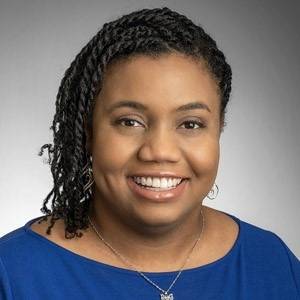 Dr. Victoria Buchanan, DNP (Class 40), CNM, believes that hospital-based nurse-midwifery is one of the key solutions to the maternal mortality crisis in the United States. She believes it because she sees the results daily as a Certified Nurse-Midwife at Sentara Midwifery Specialists in Hampton, Virginia.
Dr. Victoria Buchanan, DNP (Class 40), CNM, believes that hospital-based nurse-midwifery is one of the key solutions to the maternal mortality crisis in the United States. She believes it because she sees the results daily as a Certified Nurse-Midwife at Sentara Midwifery Specialists in Hampton, Virginia.
“The reason I’m very passionate about hospital-based midwifery is because everyone thinks about midwifery in the home,” Buchanan said. “I love it and think it should be an option, but the majority of women are going into hospitals and giving birth. Why not give them access to midwifery care which will improve outcomes?”
Sentara Midwifery Specialists, which is under the Sentara Health hospital system in Virginia, is the first independent, in-hospital midwifery practice in the Hampton Roads region, which boasts a population of approximately 1.8 million. Sentara Midwifery Specialists is comprised of five midwives, with four additional flex midwives who help cover during vacations. The group collaborates with an OB group but employs no obstetricians. With only one OB group in the area – the one that Sentara Midwifery Specialists partners with – Buchanan says Hampton is considered a healthcare desert for obstetric care.
Buchanan estimates that 65 to 75 percent of Sentara Midwifery Specialists’ patient population are Black and that the majority of their patients are on Medicaid.
“We have a great relationship with our high-risk specialists. They work with us, so we make sure we keep our patients safe,” Buchanan said. “Our outcomes speak for themselves. We don’t just take care of people who are low-risk. We are proudly in the moderate risk category, which means we care for people who have higher BMIs, preexisting conditions, controllable levels of high blood pressure, and thyroid disorders.”
“For the last two years, we have maintained a C-section rate below 16 percent. This year, we are at 14 percent, with a patient population that would typically be closer to 30 percent. It proves my theory – and the theory of our entire practice – that if you give high-quality care to people and give them access to midwifery care specifically, people at higher risk can still have excellent outcomes.”
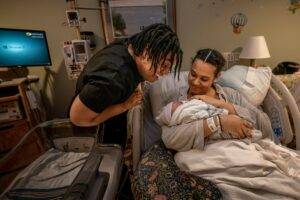
Buchanan’s determination to fill the healthcare gap in Hampton stems from being born at Langley Air Force Base in Hampton. Though her military family moved around frequently, Buchanan has always considered Hampton home, and rightly so. After all, it was in Hampton that she first dreamt of a career in healthcare.
“When I was a kid, I wanted to be a pediatrician,” Buchanan said. “Then I heard there were about eight years of medical school on top of your bachelor’s degree, and I thought that was a long time before I actually do what I want to do.”
As a teen volunteer at a local hospital, she began noticing the important role of nurses.
“I thought, ‘Nurses do a whole lot of great things. Let me try doing that.’ So I went to school for nursing to become a nurse practitioner,” said Buchanan, who graduated from Hampton University. “When I went to clinicals, one of the nurses actually let me check a cervix, and I was able to feel the baby’s head. That was the start for me. I saw the birth, cried my eyes out, and knew I was hooked. I decided I wanted to be a labor and delivery nurse.”
After college, she began her nursing career and, by 2015, was a labor and delivery nurse. The experience was eye-opening.
“I enjoyed it a lot, but I kept on seeing that these women were not getting the births that they wanted to have,” Buchanan said. “They were coming in here with their goals and their birth plans but were not getting the results. A lot of them were getting C-sections when they could have had a vaginal birth. Many of the patients were not given enough time in labor, or they were being induced electively. Often the patients’ desired providers weren’t available, and they were stuck in the bed, unable to move around throughout labor.”
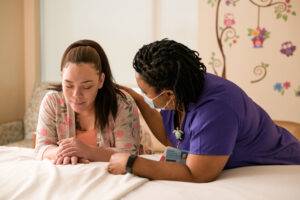 “We as nurses try to advocate for our patients, but I realized that the damage has already been done. Your provider makes an enormous difference in what kind of birth experience you have. These clients wanted a type of birth that was more natural, less intervention unless it was medically necessary.”
“We as nurses try to advocate for our patients, but I realized that the damage has already been done. Your provider makes an enormous difference in what kind of birth experience you have. These clients wanted a type of birth that was more natural, less intervention unless it was medically necessary.”
It wasn’t until she had a conversation with one of her coworkers who was studying to become a midwife that Buchanan considered midwifery. When Buchanan asked her colleague why she wanted to become a midwife, the simple answer was, “Because we have to make a difference.”
Those words inspired Buchanan to become a Certified Nurse-Midwife at Frontier Nursing University.
“I learned that if we intervene unnecessarily, it usually causes more harm than good,” Buchanan said. “I saw how midwifery can make a change in those statistics.”
Buchanan continued working as a nurse while attending Frontier, but she already knew that midwifery was for her.
“My mindset as a midwife, the belief in physiologic birth, came from Frontier,” said Buchanan, who also earned her DNP at Frontier so she could potentially teach someday. “Frontier gave me the research to back up what I believed. Midwifery is researched and evidence-based. It made me more confident in my decisions. We want to support women’s choices but also keep them safe.”
That’s why Buchanan believes so strongly in the collaboration between midwifery and obstetrics practices. The data demonstrates that it is a successful model.
“Trust and believe that I stay within my scope of practice,” Buchanan said. “Once you step outside that scope and you are high risk, then I bring in my doctors, sometimes in a collaboration and sometimes in a complete transfer. That’s why I like having our high-risk specialists collaborate with us. The system can work.”
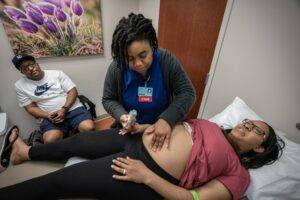
It works, Buchanan says, because the patients are the top priority. The approach, she says, begins with listening and understanding.
“It is a true pleasure to be able to live in this area and see my patients in the community,” she said. “When our clients come back, they say, ‘You cared about me and took the time to listen.’ I think the number one factor in improving maternal mortality is listening to women and being able to believe women. I find that when my clients call me because they are not sure what’s going on or why they are having some discomfort or pain, that’s new. A lot of women – especially Black women – are dismissed and are told that their pain is not important. One of the reasons why our clients are doing better and are having these good results, I believe, is because we are allowed to have longer visits to figure out what’s going on.”
Just like the expectant mothers come in with their birth plans and goals, Buchanan says she and her fellow nurse-midwives at Sentara also have a plan. Their plan is to create the best possible birth experience for the best possible outcomes.
“We want you to leave this birth experience without having trauma that you have to live with,” she said. “We have a very high obligation to make sure you feel loved, safe, and secure. When you feel safe and secure, you do better. When we listen, we respond to danger signs earlier.”
“More hospitals need to invest in midwifery care,” Buchanan continued. “If midwifery was supported by the hospital systems, there would not only be better care, but the hospitals could also utilize their surgeons to do more procedures. Your results will improve if you utilize your advanced practice practitioners – nurse practitioners and midwives.”
For her part, Buchanan is investing in midwifery care by being a frequent preceptor for nurse-midwifery students, including many from Frontier. She estimates that she has precepted 15 students in the past four years, about 75 percent of whom were FNU students. “As long as I have the ability and the space, I will continue to precept students,” Buchanan said. “I learn a lot from my students, and they learn from me. It’s a mutual experience.”
If she has her way, many of those students could very well wind up joining Buchanan at Sentara. She hopes to see her own practice grow and expand to other Sentara locations.
“For the hospital, our hope is that the goal is to replicate ourselves,” she said. “Our system is very large. If I could see a Sentara Midwifery Specialists in every hospital that has obstetric care, that would be perfect. Virginia would flourish, and we would be the prime place to go to for birth. That’s what I see in the future.”
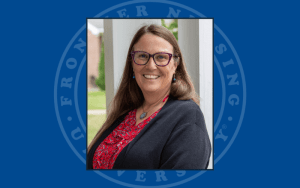
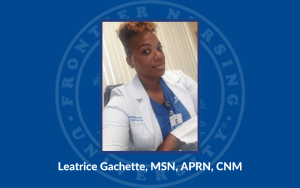
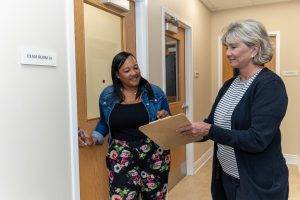



















 Carrie Belin is an experienced board-certified Family Nurse Practitioner and a graduate of the Johns Hopkins DNP program, Johns Hopkins Bloomberg School of Public Health, Georgetown University School of Nursing, and Johns Hopkins School of Nursing. She has also completed fellowships at Georgetown and the University of California Irvine.
Carrie Belin is an experienced board-certified Family Nurse Practitioner and a graduate of the Johns Hopkins DNP program, Johns Hopkins Bloomberg School of Public Health, Georgetown University School of Nursing, and Johns Hopkins School of Nursing. She has also completed fellowships at Georgetown and the University of California Irvine. Angie has been a full-scope midwife since 2009. She has experience in various birth settings including home, hospital, and birth centers. She is committed to integrating the midwifery model of care in the US. She completed her master’s degree in nurse-midwifery at Frontier Nursing University (FNU) and her Doctorate at Johns Hopkins University. She currently serves as the midwifery clinical faculty at FNU. Angie is motivated by the desire to improve the quality of healthcare and has led quality improvement projects on skin-to-skin implementation, labor induction, and improving transfer of care practices between hospital and community midwives. In 2017, she created a short film on skin-to-skin called
Angie has been a full-scope midwife since 2009. She has experience in various birth settings including home, hospital, and birth centers. She is committed to integrating the midwifery model of care in the US. She completed her master’s degree in nurse-midwifery at Frontier Nursing University (FNU) and her Doctorate at Johns Hopkins University. She currently serves as the midwifery clinical faculty at FNU. Angie is motivated by the desire to improve the quality of healthcare and has led quality improvement projects on skin-to-skin implementation, labor induction, and improving transfer of care practices between hospital and community midwives. In 2017, she created a short film on skin-to-skin called 










 Justin C. Daily, BSN, RN, has ten years of experience in nursing. At the start of his nursing career, Justin worked as a floor nurse on the oncology floor at St. Francis. He then spent two years as the Director of Nursing in a small rural Kansas hospital before returning to St. Francis and the oncology unit. He has been in his current position as the Chemo Nurse Educator for the past four years. He earned an Associate in Nurse from Hutchinson Community College and a Bachelor of Science in Nursing from Bethel College.
Justin C. Daily, BSN, RN, has ten years of experience in nursing. At the start of his nursing career, Justin worked as a floor nurse on the oncology floor at St. Francis. He then spent two years as the Director of Nursing in a small rural Kansas hospital before returning to St. Francis and the oncology unit. He has been in his current position as the Chemo Nurse Educator for the past four years. He earned an Associate in Nurse from Hutchinson Community College and a Bachelor of Science in Nursing from Bethel College. Brandy Jackson serves as the Director of Undergraduate Nursing Programs and Assistant Educator at Wichita State University and Co-Director of Access in Nursing. Brandy is a seasoned educator with over 15 years of experience. Before entering academia, Brandy served in Hospital-based leadership and Critical Care Staff nurse roles. Brandy is passionate about equity in nursing education with a focus on individuals with disabilities. Her current research interests include accommodations of nursing students with disabilities in clinical learning environments and breaking down barriers for historically unrepresented individuals to enter the nursing profession. Brandy is also actively engaged in Interprofessional Education development, creating IPE opportunities for faculty and students at Wichita State. Brandy is an active member of Wichita Women for Good and Soroptimist, with the goal to empower women and girls. Brandy is a TeamSTEPPS master trainer. She received the DASIY Award for Extraordinary Nursing Faculty in 2019 at Wichita State University.
Brandy Jackson serves as the Director of Undergraduate Nursing Programs and Assistant Educator at Wichita State University and Co-Director of Access in Nursing. Brandy is a seasoned educator with over 15 years of experience. Before entering academia, Brandy served in Hospital-based leadership and Critical Care Staff nurse roles. Brandy is passionate about equity in nursing education with a focus on individuals with disabilities. Her current research interests include accommodations of nursing students with disabilities in clinical learning environments and breaking down barriers for historically unrepresented individuals to enter the nursing profession. Brandy is also actively engaged in Interprofessional Education development, creating IPE opportunities for faculty and students at Wichita State. Brandy is an active member of Wichita Women for Good and Soroptimist, with the goal to empower women and girls. Brandy is a TeamSTEPPS master trainer. She received the DASIY Award for Extraordinary Nursing Faculty in 2019 at Wichita State University.  Dr. Sabrina Ali Jamal-Eddine is an Arab-disabled queer woman of color with a PhD in Nursing and an interdisciplinary certificate in Disability Ethics from the University of Illinois Chicago (UIC). Dr. Jamal-Eddine’s doctoral research explored spoken word poetry as a form of critical narrative pedagogy to educate nursing students about disability, ableism, and disability justice. Dr. Jamal-Eddine now serves as a Postdoctoral Research Associate in UIC’s Department of Disability and Human Development and serves on the Board of Directors of the National Organization of Nurses with Disabilities (NOND). During her doctoral program, Sabrina served as a Summer Fellow at a residential National Endowment of the Humanities (NEH) Summer Institute at Arizona State University (2023), a summer fellow at Andrew W. Mellon’s National Humanities Without Walls program at University of Michigan (2022), a Summer Research Fellow at UC Berkeley’s Othering & Belonging Institute (2021), and an Illinois Leadership Education in Neurodevelopmental and related Disabilities (LEND) trainee (2019-2020).
Dr. Sabrina Ali Jamal-Eddine is an Arab-disabled queer woman of color with a PhD in Nursing and an interdisciplinary certificate in Disability Ethics from the University of Illinois Chicago (UIC). Dr. Jamal-Eddine’s doctoral research explored spoken word poetry as a form of critical narrative pedagogy to educate nursing students about disability, ableism, and disability justice. Dr. Jamal-Eddine now serves as a Postdoctoral Research Associate in UIC’s Department of Disability and Human Development and serves on the Board of Directors of the National Organization of Nurses with Disabilities (NOND). During her doctoral program, Sabrina served as a Summer Fellow at a residential National Endowment of the Humanities (NEH) Summer Institute at Arizona State University (2023), a summer fellow at Andrew W. Mellon’s National Humanities Without Walls program at University of Michigan (2022), a Summer Research Fellow at UC Berkeley’s Othering & Belonging Institute (2021), and an Illinois Leadership Education in Neurodevelopmental and related Disabilities (LEND) trainee (2019-2020). Vanessa Cameron works for Vanderbilt University Medical Center in Nursing Education & Professional Development. She is also attending George Washington University and progressing towards a PhD in Nursing with an emphasis on ableism in nursing. After becoming disabled in April 2021, Vanessa’s worldview and perspective changed, and a recognition of the ableism present within healthcare and within the culture of nursing was apparent. She has been working since that time to provide educational foundations for nurses about disability and ableism, provide support for fellow disabled nursing colleagues, and advocate for the disabled community within healthcare settings to reduce disparities.
Vanessa Cameron works for Vanderbilt University Medical Center in Nursing Education & Professional Development. She is also attending George Washington University and progressing towards a PhD in Nursing with an emphasis on ableism in nursing. After becoming disabled in April 2021, Vanessa’s worldview and perspective changed, and a recognition of the ableism present within healthcare and within the culture of nursing was apparent. She has been working since that time to provide educational foundations for nurses about disability and ableism, provide support for fellow disabled nursing colleagues, and advocate for the disabled community within healthcare settings to reduce disparities. Dr. Lucinda Canty is a certified nurse-midwife, Associate Professor of Nursing, and Director of the Seedworks Health Equity in Nursing Program at the University of Massachusetts Amherst. She earned a bachelor’s degree in nursing from Columbia University, a master’s degree from Yale University, specializing in nurse-midwifery, and a PhD from the University of Connecticut. Dr. Canty has provided reproductive health care for over 29 years. Her research interests include the prevention of maternal mortality and severe maternal morbidity, reducing racial and ethnic health disparities in reproductive health, promoting diversity in nursing, and eliminating racism in nursing and midwifery.
Dr. Lucinda Canty is a certified nurse-midwife, Associate Professor of Nursing, and Director of the Seedworks Health Equity in Nursing Program at the University of Massachusetts Amherst. She earned a bachelor’s degree in nursing from Columbia University, a master’s degree from Yale University, specializing in nurse-midwifery, and a PhD from the University of Connecticut. Dr. Canty has provided reproductive health care for over 29 years. Her research interests include the prevention of maternal mortality and severe maternal morbidity, reducing racial and ethnic health disparities in reproductive health, promoting diversity in nursing, and eliminating racism in nursing and midwifery. Dr. Lisa Meeks is a distinguished scholar and leader whose unwavering commitment to inclusivity and excellence has significantly influenced the landscape of health professions education and accessibility. She is the founder and executive director of the DocsWithDisabilities Initiative and holds appointments as an Associate Professor in the Departments of Learning Health Sciences and Family Medicine at the University of Michigan.
Dr. Lisa Meeks is a distinguished scholar and leader whose unwavering commitment to inclusivity and excellence has significantly influenced the landscape of health professions education and accessibility. She is the founder and executive director of the DocsWithDisabilities Initiative and holds appointments as an Associate Professor in the Departments of Learning Health Sciences and Family Medicine at the University of Michigan. Dr. Nikia Grayson, DNP, MSN, MPH, MA, CNM, FNP-C, FACNM (she/her) is a trailblazing force in reproductive justice, blending her expertise as a public health activist, anthropologist, and family nurse-midwife to champion the rights and health of underserved communities. Graduating with distinction from Howard University, Nikia holds a bachelor’s degree in communications and a master’s degree in public health. Her academic journey also led her to the University of Memphis, where she earned a master’s in medical anthropology, and the University of Tennessee, where she achieved both a master’s in nursing and a doctorate in nursing practice. Complementing her extensive education, she completed a post-master’s certificate in midwifery at Frontier Nursing University.
Dr. Nikia Grayson, DNP, MSN, MPH, MA, CNM, FNP-C, FACNM (she/her) is a trailblazing force in reproductive justice, blending her expertise as a public health activist, anthropologist, and family nurse-midwife to champion the rights and health of underserved communities. Graduating with distinction from Howard University, Nikia holds a bachelor’s degree in communications and a master’s degree in public health. Her academic journey also led her to the University of Memphis, where she earned a master’s in medical anthropology, and the University of Tennessee, where she achieved both a master’s in nursing and a doctorate in nursing practice. Complementing her extensive education, she completed a post-master’s certificate in midwifery at Frontier Nursing University.









 Dr. Tia Brown McNair is the Vice President in the Office of Diversity, Equity, and Student Success and Executive Director for the Truth, Racial Healing, and Transformation (TRHT) Campus Centers at the American Association of Colleges and Universities (AAC&U) in Washington, DC. She oversees both funded projects and AAC&U’s continuing programs on equity, inclusive excellence, high-impact practices, and student success. McNair directs AAC&U’s Summer Institutes on High-Impact Practices and Student Success, and TRHT Campus Centers and serves as the project director for several AAC&U initiatives, including the development of a TRHT-focused campus climate toolkit. She is the lead author of From Equity Talk to Equity Walk: Expanding Practitioner Knowledge for Racial Justice in Higher Education (January 2020) and Becoming a Student-Ready College: A New Culture of Leadership for Student Success (July 2016 and August 2022 Second edition).
Dr. Tia Brown McNair is the Vice President in the Office of Diversity, Equity, and Student Success and Executive Director for the Truth, Racial Healing, and Transformation (TRHT) Campus Centers at the American Association of Colleges and Universities (AAC&U) in Washington, DC. She oversees both funded projects and AAC&U’s continuing programs on equity, inclusive excellence, high-impact practices, and student success. McNair directs AAC&U’s Summer Institutes on High-Impact Practices and Student Success, and TRHT Campus Centers and serves as the project director for several AAC&U initiatives, including the development of a TRHT-focused campus climate toolkit. She is the lead author of From Equity Talk to Equity Walk: Expanding Practitioner Knowledge for Racial Justice in Higher Education (January 2020) and Becoming a Student-Ready College: A New Culture of Leadership for Student Success (July 2016 and August 2022 Second edition).